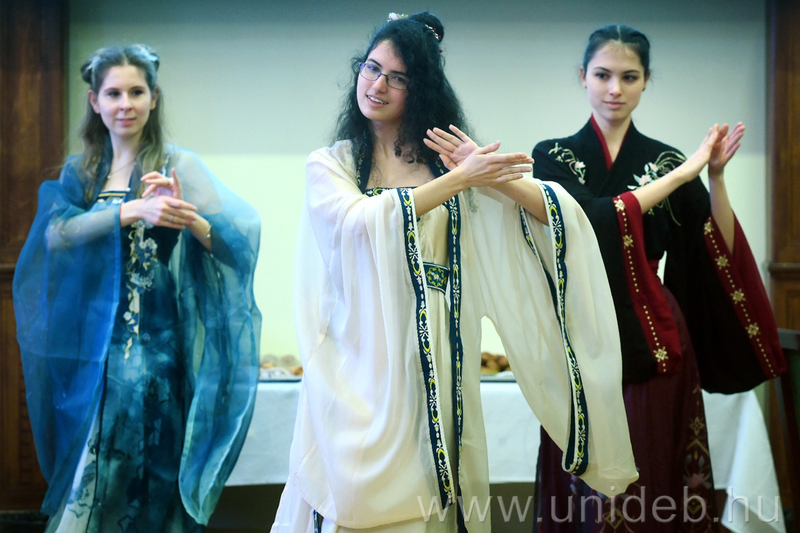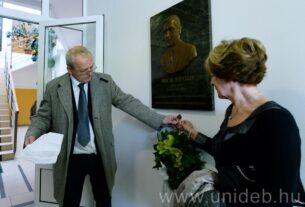The Confucius Institute at the University of Debrecen organized a memorial event to mark its fifth anniversary. The event was attended by the institution’s leadership, faculty members, as well as representatives from the Tianjin University of Foreign Studies and the Counselor of the Embassy of the People’s Republic of China in Budapest.
The Confucius Institute at the University of Debrecen was established in the fall of 2019 as a result of the cultural and educational cooperation between the University of Debrecen and the Tianjin University of Foreign Studies. Confucius Institutes were founded by the People’s Republic of China to promote the Chinese language and culture, and to develop cultural relations. With over 500 institutes worldwide, the one in Debrecen is the fifth in Hungary. The institute primarily focuses on teaching the Chinese language, cultural exchange, and organizing cultural events, lectures, film screenings, and celebrations related to various Chinese holidays for students, faculty, and the local community.
Thanks to the work of native and Hungarian instructors, the University of Debrecen hosts one of the key centers for Chinese studies, culture, language, history, and philosophy in Hungary. The anniversary was celebrated on April 1st, with guests coming from China.
The delegation members first visited the diplomatic mission in Budapest, where they met with Ambassador Gong Tao, and then continued their program at the Hungarian Library Association, where a Chinese-Hungarian agreement was made on academic and research collaboration, further strengthening language education, and facilitating study trips to China for language learners and faculty at Confucius Institutes, including those at the University of Debrecen.
Upon their arrival in Debrecen, the Tianjin guests were welcomed by István Puskás, Deputy Mayor of Debrecen responsible for cultural affairs.
Before the ceremony, the delegation led by Zhou Honglei, Party Secretary of Tianjin University of Foreign Studies, was received by Zoltán Szilvássy, the Rector of the University of Debrecen, and Okszána Kiszil, Director of the Rector’s Office Coordination and Strategic Directorate. Together, they reviewed the achievements of the Confucius Institute since its establishment and mutually assured each other of continued cooperation and support.
Zoltán Szilvássy emphasized that cooperation between the city, university, local industry, and foreign companies had been important in Debrecen for almost 500 years, and the Confucius Institute, which was established five years ago, has actively contributed to the city and industrial companies, especially those with Chinese partners such as CATL, EVE Power, and Semcorp.
Okszána Kiszil reflected on the history of the University of Debrecen, founded in 1538, and highlighted that today it is one of Hungary’s largest higher education institutions, with 13 faculties, 25 doctoral schools, and nearly 40,000 students, including 418 Chinese students.
In his festive speech, the Counselor of the Chinese Embassy in Budapest, Han Dongshen, highlighted the importance of language as a tool of communication, a carrier of culture, and a bridge for dialogue and exchange between civilizations. He also emphasized that the Confucius Institute at the University of Debrecen is a key channel for fostering dialogue and mutual learning.
Since its founding in November 2019, the Confucius Institute has continuously developed its educational system, launched language, cultural, and thematic lectures, and its registered student numbers have exceeded 3,500.
Today, the Confucius Institute in Debrecen has become a significant Chinese language teaching center and cultural exchange platform in both the city and Hungary. Zhou Honglei highlighted the long-term cooperation and visits between the two universities, resulting in a brotherly friendship that embodies the Confucian principles of discussion, construction, and mutual benefit.
Zhou Honglei also discussed the success of various programs, including the Mid-Autumn Festival, the Petőfi Literary Exhibition, Chinese Language Day, the Chinese Bridge Symposium, and the recent Chinese Lantern Festival. At the Lantern Festival, the “Dancing Fairies” performance by Hungarian students of the University of Debrecen was showcased.
The event also featured a surprise production by the University’s Chinese Students Association, a short film about student life, and a video celebrating the five-year history of the institute, created by the Multimedia and E-learning Technical Center.
After the ceremony, the Chinese guests met with their fellow countrymen studying at the University of Debrecen.
To mark the anniversary, the Confucius Institute published a special edition of its anniversary publication.


















